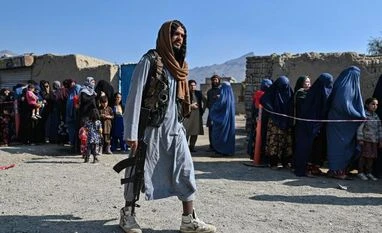Taliban spokesperson Zabihullah Mujahid has called on countries hosting Afghan refugees to not forcefully deport them as the migrants do not have any preparation for it yet. Mujahid also called for tolerance based on Islamic and neighbourly manners, TOLO News reported.
TOLO News is an Afghan news channel broadcasting from Kabul.
The Taliban spokesperson said Afghans have been forced to migrate to various countries due to the wars over the past 45 years in Afghanistan.
As per Mujahid's statement, Afghans have not created problems or destabilization in host countries. He urged neighbouring countries to treat them properly, TOLO News reported.
This comes as the Pakistan caretaker government announced October 31 as the deadline for Afghan refugees to leave the country.
The deadline called for nearly 2 million Afghan refugees to leave Pakistan or they will face forced deportation.
"The Afghans who are being forcefully deported, their materials, money and other property are their personal property and no one has the right to seize it from them and impose unfair and unjust conditions on them," the statement read.
The statement called on Afghan traders to cooperate with the commission established to help the refugees. It also instructed the Ministry of Industry and Commerce and other relevant ministries to provide necessary facilities for the traders and industrial owners who are returning home.
The Taliban urged Afghans who are in exile due to political concerns to return, saying that they can live their lives in calmness in Afghanistan.
Amid forced expulsion by Pakistan, a group of Afghan refugees on Monday started a protest outside the office of the United Nations Human Commissioner for Refugees (UNHCR) in Islamabad, according to Khaama Press.
Over 1.7 million undocumented migrants in Pakistan were given until November 1 to depart by the country's temporary administration, less than a month ago. Pakistan issued a warning to migrants, threatening to arrest and deport them if they do not leave the nation.
The protest, which took place on Monday, was launched by defence lawyers, journalists, human rights activists, and individuals vulnerable to the Taliban, who argued that the UNHCR hasn't properly examined their cases over the last two years, Khaama Press reported.
The protesters asserted that Afghan migrants are not granted visas by the Pakistani Embassy in Kabul, and the UNHCR is not willing to give them proper papers that would shield them from abuse by Pakistani authorities.
Worrying that leaving Pakistan will expose them to the violations of human rights by the Taliban, the Afghan refugees continue to remain in a difficult position. Moreover, according to Khaama Press, the lawyers for Afghan women also accused the UNHCR of failing to act in response to the demonstrations.
(Only the headline and picture of this report may have been reworked by the Business Standard staff; the rest of the content is auto-generated from a syndicated feed.)
You’ve reached your limit of {{free_limit}} free articles this month.
Subscribe now for unlimited access.
Already subscribed? Log in
Subscribe to read the full story →

Smart Quarterly
₹900
3 Months
₹300/Month
Smart Essential
₹2,700
1 Year
₹225/Month
Super Saver
₹3,900
2 Years
₹162/Month
Renews automatically, cancel anytime
Here’s what’s included in our digital subscription plans
Access to Exclusive Premium Stories
Over 30 subscriber-only stories daily, handpicked by our editors


Complimentary Access to The New York Times
News, Games, Cooking, Audio, Wirecutter & The Athletic
Business Standard Epaper
Digital replica of our daily newspaper — with options to read, save, and share


Curated Newsletters
Insights on markets, finance, politics, tech, and more delivered to your inbox
Market Analysis & Investment Insights
In-depth market analysis & insights with access to The Smart Investor


Archives
Repository of articles and publications dating back to 1997
Ad-free Reading
Uninterrupted reading experience with no advertisements


Seamless Access Across All Devices
Access Business Standard across devices — mobile, tablet, or PC, via web or app



)
